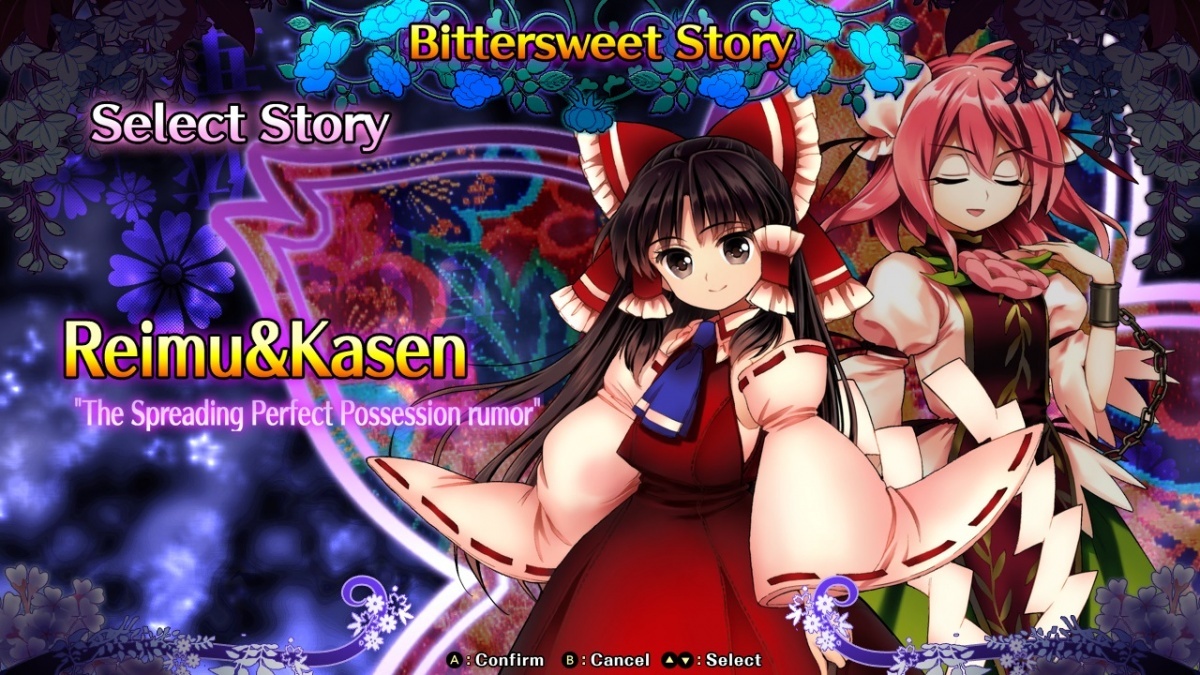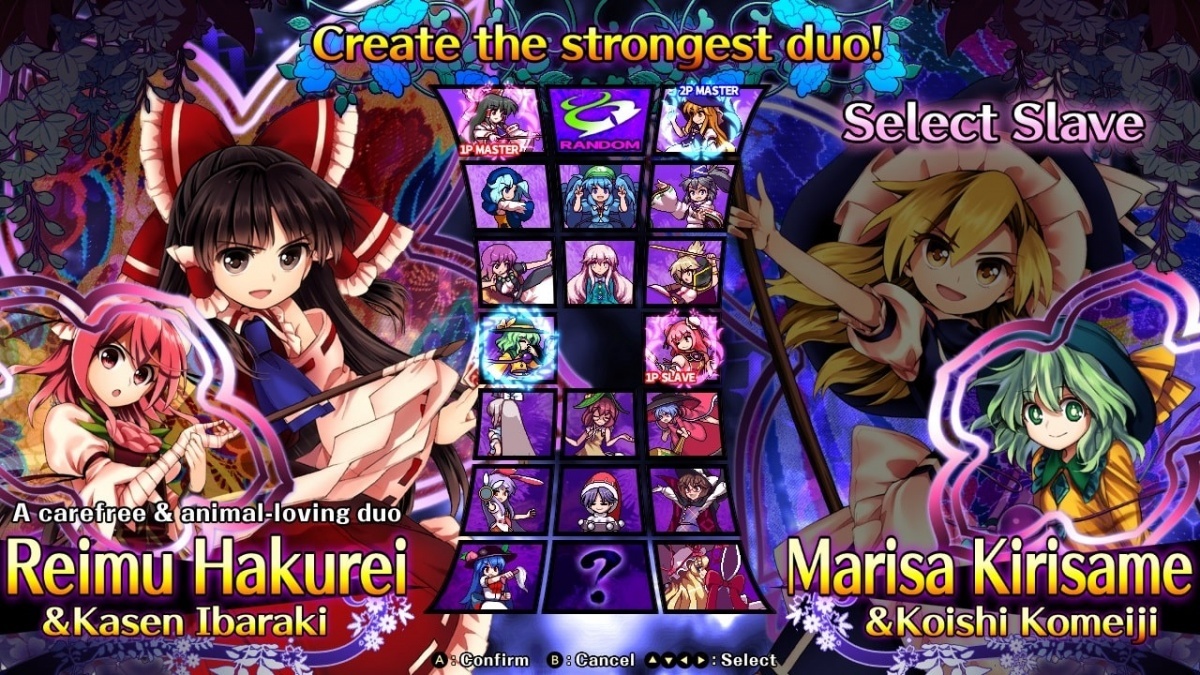Touhou Hyouibana - Antimony of Common Flowers (Nintendo Switch) Review
By Joshua Goldie  25.08.2022
25.08.2022

Touhou is a major part of the Japanese indie game scene and in recent years many of its fan-made spin-off titles have made it overseas. Unfortunately, the main series of shoot-em up (SHMUP) games have not, at least not officially. Every couple of games however, the main series by Team Shanghai Alice delves into a new genre, typically the fighting game genre. Touhou Hyouibana ~ Antinomy of Common Flowers is the sixth and latest fighting game in the official, mainline, Touhou series, co-developed by studio Twilight Frontier, and is the first to be officially published outside of Japan by publisher Phoenixx (on PS4 and Nintendo Switch).
The game is a tag-team fighter, where players will choose from two of the games nineteen playable characters, with one character acting as the primary fighter ('master') and the other as a secondary unit ('slave'). This is done through an act called 'Perfect Possession'. There are number of ways that the game distinguishes between the 'master' and 'slave' in battle, and understanding these differences is a vital part of mastering the game.
The most obvious difference is that only the former can use the games Spell cards. Before battle a single Spell card must be chosen from a choice of three, each is a different attack, and each requires a different amount of magic to pull it off. This magic is charged through landing blows on the opponent, as is the games special meter which sits just above the magic meter.

Both 'master' and 'slave' have access to the special meter, which allows for unique attacks to be performed. All fighters have access to basic punches and kicks with the X button but using A or B allows for the special attacks that can range from projectiles to dash attacks. Each character has a variety of moves, with the input being similar to the Super Smash Bros. series where players point the stick in a different direction for an alternate outcome.
Another difference between the 'master' and 'slave' is that when the former takes damage, the players health decreases but by swapping over to the latter, the 'master' can recover some health. The 'slave' cannot do this and the 'slave' can only fight for as long the players 'occult meter' is not depleted. Taking damage as the 'slave' will cause it to empty and this will force the player back into the 'master' character, with the ability to swap characters temporarily removed.
Between all the meters and moves, the game can be a lot to take in but it is easier to get to grips with in action, as is the case with the deep mechanics of many versus fighting games. One thing that makes Touhou Hyouibana ~ Antinomy of Common Flowers standout, however, is that the entire game takes place in-flight and not on the ground. It is also very projectile based.
It is impressive that the developers were able to seamlessly transfer over the mechanics of a SHMUP into a 2D fighting game and it makes this title stand out from its competition. Having no ground to deal with gives the player three planes to fight on and allows for the character to both go over and under incoming attacks, although the optimal strategy is often to go directly into and through the projectiles! To prevent players from standing on one side of the screen and spamming ranged attacks, they get a shield when they dash directly into a projectile, negating the damage. It is a very unusual mechanic but works to keep the game from becoming broken.

It is also a necessity for the game's story mode. Touhou Hyouibana ~ Antinomy of Common Flowers has several campaigns for players to fight through and a secret character to unlock if they do. While the core of any fighting game is often the versus mode, with the ability to fight the AI or other players, both locally and online, the story mode offers something unique. Sticking to the series' roots once more, the second round of every battle in the story mode turns into a SHMUP, but one that plays like a fighting game. The opponent flies around the screen launching projectiles with a shield up and the player must dodge these attacks and wait for the moment the opponent swaps to their 'slave' to attack, as it is the only time the shield becomes vulnerable.
This addition to the story mode is a remarkably clever way to stop the game from feeling samey, as many fighting game story modes tend to. Each character has a unique boss phase meaning that even though the player will fight a lot of the same enemies in their adventure, the boss battles can feel wholly original as the combination of 'master' and 'slave' will also change up the attacks used.
As for the story itself however, it follows protagonist Reimu and her investigation into the strange 'Perfect Possession' phenomenon taking place amongst the games cast. Unfortunately, that is all that can be said on the matter and for a good reason. Despite the fact that the entire game was beaten for review, it was done so exclusively in Japanese and not exactly by choice.

Despite this game releasing on the western eshop, both in Europe and America, the default language option is not English, it is Japanese. This was a fact not discovered until sitting down to write this review and has been a source of conflict. Assuming the game was only in Japanese because that was the default meant the only thing understood was the main menus because they were in English. Everything from the character names to how to play the game was in Japanese and consequently researching a translation took a lot of time.
This also meant the dialogue heavy story could not be read; only assumptions could be made on what was happening in it and understandably that led to a readiness to criticise this aspect of the game, until the truth about the language options was revealed. However, this is also a fault of the game. A layman and someone not familiar with the series could easily pick up this game and assume it is only in Japanese, after all it is a niche, previously Japan-only indie series so it is totally possible for it to only be released in Japanese and is on the western eshop simply for convenience's sake.
That is not the case and it is a good thing as well, as the lack of English was the major gripe with the game. The game is still really fun even in Japanese but has been elevated now that it is in English. Unfortunately, as much as the story mode is praised, the plot is not so entrancing with it that a replay in English will happen, not even on a harder difficulty - it is good but it is not fantastic.

Cubed3 Rating
Great - Silver Award

Even before discovering the option to play the game in English, Touhou Hyouibana ~ Antinomy of Common Flowers was one of the most interesting versus fighting games that has been played for a while. Not being familiar with the Touhou cast (and not discovering the language options) certainly hampered the overall enjoyment for the game, but the mechanics are so solid that those aspects can be for the most part ignored. It is a great fighting game and one all fans of the genre should try out in order to experience something fresh and exciting.
Comments
Comments are currently disabled

 Sign In
Sign In Game Details
Game Details
 Out now
Out now  Out now
Out now  Out now
Out now  Out now
Out now  Subscribe to this topic
Subscribe to this topic Features
Features






 Top
Top

